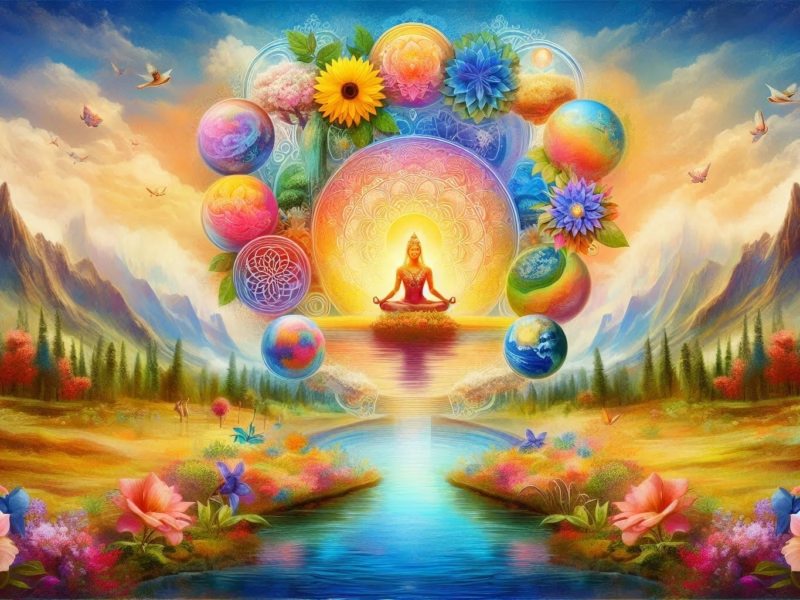And now we’re going to learn about an important concept in Hinduism called samsara. What is samsara hinduism? In simple terms, samsara refers to the cycle of birth, death, and rebirth. It is a central idea in Hindu philosophy and helps us understand the journey of the soul through different lives. In Hinduism the soul is known as atman. The atman is eternal, meaning it never dies. Our physical body is not eternal. When a person dies, their soul does not end. Instead it enters another body and begins a new life. This continuous cycle of life, death, and rebirth is what we call samsara in Hinduism.
Wheel Of Karma
Samsara hinduism is often compared to a wheel. Imagine a wheel that keeps turning endlessly. The soul is like a traveller on this wheel, moving through different stages of life and existence. The cycle can feel never-ending. But Hinduism teaches us that it is possible to break free from samsara.
Now you may wonder why the soul keeps going through this cycle. The answer lies in something called karma. Karma is the law of cause and effect. It means that our actions, whether good or bad, have consequences. Those consequences influence what happens to us in this life and in our future lives. For example, if someone performs good deeds and leads a virtuous life, they accumulate positive karma. The positive karma can lead to a better life when they are reborn. On the other hand, bad deeds result in negative karma, which can cause suffering in future lives.
Ways to Break Free From Samsara
In samsara Hinduism, the ultimate goal is to break free from this cycle. This is called liberation, moksha, or mukti. Moksha means freedom from the cycle of samsara and union with the divine. When a soul achieves moksha, it no longer has to be reborn. Instead it becomes one with the universal spirit known as Brahman. Atman becomes Brahman with moksha.
Achieving moksha is not easy. It requires a deep understanding of the self and universe. Samsara Hinduism teaches different paths to reach moksha; these paths are called yogas.
Jnana yoga:
the path of knowledge. This involves studying spiritual texts and gaining wisdom about the nature of the soul and the universe.
Bhakti yoga:
the path of devotion. This involves developing a deep love and emotional connection with God through prayer, worship, and love.
Karma yoga:
the path of action. This means performing selfless actions without expecting any rewards.
Raja yoga:
The path of meditation. This involves controlling the mind and body to achieve spiritual awareness.
Understanding Samsara
Hindu scriptures such as the Bhagavad Gita and Upanishads provide guidance on understanding samsara. These texts explain that the soul’s journey through samsara is influenced by our choices, actions, and understanding of the divine. Many Hindus believe that samsara is also an opportunity for growth and learning. Each life offers a chance to learn lessons, overcome challenges, and move closer to spiritual enlightenment. For example, if someone faces difficulties in one life, it might be because they are learning important lessons that will help their soul grow. In this way, Hinduism teaches us that life is not just about material success but also about spiritual growth.
Concept of Dharma
One important concept related to samsara is Dharma. Dharma means duty or the right way of living. By following their Dharma, individuals can create positive karma and move closer to moksha. Dharma varies for each person based on their age, role in society, and personal circumstances. For example, a student’s dharma might be to study and gain knowledge, while a parent’s dharma might be to take care of their family.
The Natural Path
It is also important to note that samsara Hinduism does not view it as something to fear. Instead, death is seen as a natural part of the soul’s journey. It is simply a transformation from one life to the next. This perspective helps many Hindus find peace and acceptance in the face of loss.
To summarize samsara Hinduism, the cycle of birth, death, and rebirth. The cycle continues until it achieves moksha or liberation. Karma, Dharma, and yoga are paths to shape this journey. While samsara may seem endless, Hinduism teaches us that it is possible to break free and unite with the divine. Understanding samsara Hinduism can help us see life as a spiritual journey. Samsara Hinduism reminds us to act with kindness, follow Dharma, and seek a deeper connection with the divine. By doing so, we can move closer to liberation and ultimate peace.



2 thoughts on “The Fascinating Truth About Samsara in Hinduism!”